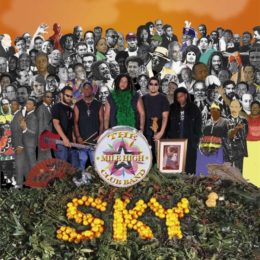I was born in 1917, and grew up in Kingston. My mother was born in Jamaica of Cuban parents, but I never investigated why her parents came here. My father was born in Lebanon — came to Jamaica with his parents when he was 12, and never went back until he was 71.
They were running away from the wars, I guess, and his parents were taking him away from Lebanon to bring him into safety — this is just where they ended up, and he died when he was 81, but I haven’t even calculated what year he was born.
I’m the youngest child, had three sisters, and I’m the only boy. When I was growing up my father was in the dry goods business. He had dry goods stores in the countryside, and then he had furniture stores in Kingston. I used to work with Joseph Issa, a family friend. I’m not sure if he was Syrian or Lebanese, but his father came from the Arab countries and opened a dry goods store here, and it mushroomed. Then the two sons took over, Joseph and Abram, and I was working for Joseph, controlling all the goods that would come in and delivering them. He also used to have jukeboxes around the island.
I did some furniture business on the side myself, but I didn’t like it. I was born musically inclined, so that’s why I went into the music business. It’s a long story, but it happened just by accident in Miami, and then by that accident I came back to Jamaica and started the music business, became the pioneer of the music business in the early 50s.
I took my father to Miami for his illness, met someone who was selling a recording machine, and bought it from him — it was a disc recorder. After I bought the machine, I used to go around recording calypsos at different nightclubs, and eventually had the records made in England. The first recording was with Lord Flea, Where Did the Little Flea Go? It started with 78s that I order from England; the discs that I made, I sent them as masters to Decca, and they made a record out of it and send it down to me. I called them up and asked them if they could do what I wanted, and they said yes. Long after that, I decided that instead of sending the discs or tapes to London to make my records, I decided to go to California to get a pressing plant to make my own records in Jamaica.
The first label I had was Times Records, which was distributed by Times Variety Store in King Street [in downtown Kingston]; that store belonged to Alec Durie, and he distributed the first calypso records. Girl and Boy by Hubert Porter, Gimme More, Ten Penny Nail — I did all the Hubert Porter records. I recorded them in a studio that I built up myself with my wife Gloria, in 129 King Street, called Records Limited, ’bout 1947. I brought down equipment from California, just one microphone, one track, and started it with my wife Gloria, who was there with me from the beginning.
Nobody else had recording facilities in Jamaica at that time: Stanley Motta came in long after me, and that was just a little voice recording set-up he had. Tewari started about two years after — I don’t even remember his first name, but they used to call him “Dada” — so I am the complete pioneer of everything. From 129 King Street, where the little studio was, I brought pressing equipment to Jamaica. They never wanted no pressing plant there before.
In 1954 I had the Pioneer Company, did 78s and albums, foreign stuff and local. I used to have franchises from the States, like with Mercury, because I went to their offices in New York, and the first records I put out were [August Musurugwa’s] Skokian, She-Boom [by the Chords], and The Little Shoemaker [by the Gaylords]. I moved to the Industrial Estate at Marcus Garvey Drive in1957, and formed Federal Records, and Records Limited became a subsidiary of Federal Records.
Artists used to follow me all over, they used to come to my home, and we used to go to garden parties. That’s what gave me the impetus of going on, seeing there’s a big market for it. Our first engineer, his name is [Graeme] Goodall, he was with the radio stations here, and I took him in. Prince Buster was always with me in the ska years, and then with Hopeton Lewis we did Take It Easy to bring in rocksteady. It was released on Merritone, which is one of my labels, then eventually [disc jockey] Winston Blake used the same name for his company. Everybody that was in the record business pass through my hands. They all was with me, ’cause there was nobody else but me.
My son Richard was born in 1943; after he grew up he came in the business. My son Paul is three years younger, he set up KK Mastering in Florida, and still have his business up there. I used to do everything, but now we only have the retail store, Record Plaza. I sold the studio and pressing plant to Tuff Gong, Bob Marley’s company, in 1981. But I’m proud of everything, as the music business was something that I loved. I know that I used to keep stepping up and up and up with everything modern, keep improving till I had everything I wanted.


















